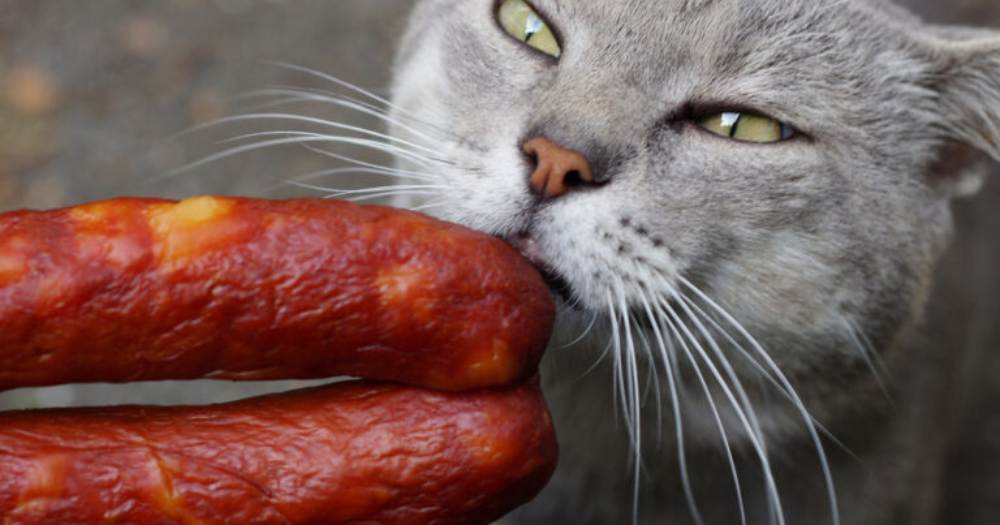Can cats eat pepperoni? One of the most popular questions that pet owners care about
Cats can be picky eaters, but they will still try a variety of foods. You may have noticed that some cats are more adventurous than others when it comes to trying new foods.
In this article, we will explore the answer to this question, as well as provide alternatives to feeding cats pepperoni. We will also discuss what pepperoni contains and whether or not it is bad for cats.
Can cats eat pepperoni?
The short answer to this question is “no”. Even though cats must eat meat and need a diet high in animal protein, pepperoni is not a good choice for them to eat. Pepperoni is a type of cured sausage made from beef, pork, or a combination of both, seasoned with spices such as paprika, garlic, and fennel seeds
Garlic and onions, which are frequently used to season pepperoni, can be toxic to cats if taken in high numbers. These ingredients can hurt a cat’s red blood cells, which can lead to anemia and symptoms like weakness, lethargy, and loss of appetite.
Is Pepperoni Bad For Cats?
Indeed, cats shouldn’t eat pepperoni. As was previously noted, pepperoni has a lot of fat and salt, both of which can be harmful to cats. In addition, pepperoni has a lot of spices that cats may not be able to handle.
Vomiting and diarrhea are among the digestive problems that too much pepperoni can bring on. The fact that pepperoni is manufactured from pork, which is not a natural food for cats and might cause health problems, should also be noted.

What Does Pepperoni Contain?
Pepperoni is a type of cured sausage that is typically made from pork, beef, or a combination of the two. It is usually flavored with paprika, garlic, and other seasonings.
Here is a list of common ingredients found in pepperoni:
- Beef
- Pork
- Salt
- Spices (such as paprika, black pepper, cayenne, and fennel seed)
- Dextrose
- Garlic
- Sodium nitrite
- BHA and BHT (preservatives)
- Lactic acid starter culture
Pepperoni is high in fat and salt, both of which can be dangerous for cats.
Alternatives to Pepperoni for Cats
There are several nutritious and safe treats besides pepperoni that your cat could like if you’re seeking something to offer it. Here are a few possibilities:
- Meat that has been cooked: Cats may enjoy a delectable and protein-rich treat of cooked chicken, turkey, or beef. Remove any bones, and stay away from flavoring with anything that might be poisonous to cats, including garlic or onions.
- Salmon or tuna in cans: Cats enjoy fish, and salmon or tuna in cans can provide both protein and omega-3 fatty acids. It should be administered with caution, though, as the amounts of salt and mercury may be excessive.
- Pumpkin puree in a can: Pumpkin puree in a can is a wonderful source of fiber and can support cats’ digestive health. Be sure you get a pure pumpkin that hasn’t had any sugar or spices added.
- Little portions of fresh fruits or vegetables: Some cats could take a small taste of cooked sweet potatoes, green beans, or blueberries. When giving fruits and veggies to cats, make careful to do your homework on which ones are safe.
- Commercial cat snacks: There are several commercial cat treats on the market that is created especially for cats and offer a healthy and balanced snack. Seek sweets that have few calories and no unhealthy components.
Owners should pick cat diets that are safe and nutritious for them and refrain from feeding them any human food without consulting a veterinarian beforehand.
Conclusion
To summarize, while cats may be drawn to the strong scent and flavor of pepperoni, it is not suggested that they be fed this sort of food. Pepperoni’s high fat, salt, and spice content can create digestive troubles and potentially lead to health concerns in cats, such as obesity or pancreatitis.
Instead, stick to a quantity of balanced and complete cat food that fits their nutritional needs, and as a safe and nutritious alternative, provide occasional treats or tiny portions of prepared meat or vegetables.
If you have any concerns regarding your cat’s food or health, always check with your veterinarian.

